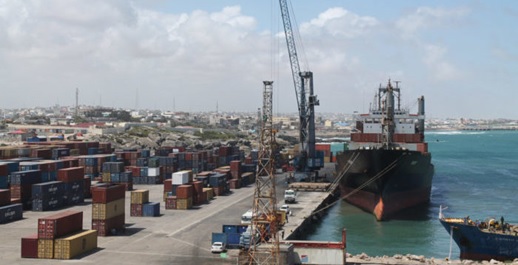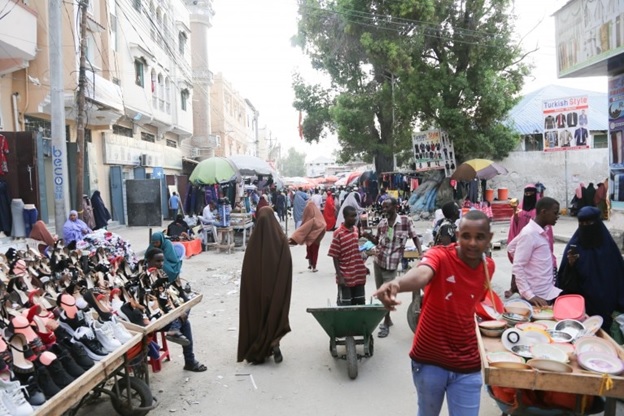By Abdulkadir Hussein
Primary consumer who facilitates profitable market but devoid of return
For imports of human consumption and use, the populations living in the regions which constitute Southwest Sate of Somalia have always depended primarily on the goods and commodities imported at the seaport of Mogadishu. Potentially, they may be considered to be the second immediate consumers who buy imports at Mogadishu seaport. Just behind Middle Shabelle and Banadir regions which host most immediate consumers of the supplies which this port provides every day – not in size though – but rather their proximity to the port makes them the primary consumer.

Looking at how the world operates in this twenty first century, to be a consumer for a service or commodities of a producer holds economic power and stakeholder influence, albeit from consumers end. But, this power can counterproductively backfire at times of extraordinary situations, like what has erupted between Russia and Western Powers where heavy dependence on Russia’s energy and gas frustrated nations in the western powers, when they reacted economically against Russia invasion in Ukraine on February 2022.
Consumers can hold economic power and stakeholder influence over a producers or suppliers, because basically, the consumer buys things to meet leisure and essential needs, and this action enables the producers in the case of imported goods to access markets for their product and service, which will offer them foreign currency, or simply put, money. So, the consumers are consistently important market to nurture and to listen to in order not to lose them.
In a peaceful and friendly time where societies are engaging socio-economically, authorities can positively tie conditions on their consumption capacity i.e., soliciting for exchange of opportunities in a bid trade deficit between the two societies could be capped to balance it in a fair manner that is pleasing to both ends. But what is foolishly awkward is to assume an exploitative economic engagement which only exclusively helps one side with monetary return.
Since Somalia operationalized its ports infrastructure in parts of its coastal terrain in the colonial and post colonial period, people inhabiting Southwest side of Somalia – and who are hypothetically perceived to be making a greater percentage of Somali population – have been a windfall buyer of the imports supplied through the Mogadishu Seaport. The port is mainly used by vessels loading for the everyday growing Banadir business community. Certainly, and to an extent, given that Somalia is incapacitated to produce enough of its own food and non-food human stuff needs, the country sends billions of united states dollars out of the country to buy millions of tons of such stuff for domestic consumption. Imports penetrating in the country annually are valued roughly over USD 4 billion according to data with OEC, The Observatory of Economic Complexity.
Because of the unavailability of effectively operating port service in these regions for a prolonged period of time, commercial entities stationed in the Southwest regions involving in international trade and who can bring oversees exports into these regions through the major ports of Somalia, especially Mogadishu port, are too limited. This signals they are not direct importers, and shows the magnitude of consumption people live in the Southwest regions are of percentage to the imported stocks that enter in Mogadishu Seaport. It is barely available now data that can communicate value of trade exchanged between Mogadishu and Southwestern Somalia, even though in common sense and educated guess it may value roughly close a few billions trade annually.
Southwest region has got its own ocean territory with Marka Port being the major commercial port that prevails structurally. Owing to the civil war that engulfed the country, this port is utterly ruined and left people living in the Southwest Somalia with an eternal shopping option to only Mogadishu seaport merchandises. Notwithstanding that, Marka port had never been forged as a standard port, notably with reasonable berthing capacity to accommodate ordinary shipping vessels. It has traditionally catered for limited fishing operations for the locality and insignificant tiny cargo vessels since its development by the Italian colonials. A side from a little attempt from humanitarian agency, WFP, that endeavored to restore some operational normality in the port, no other feasible national attempt tried to re-operationalize Marka port. WFP required the rehabilitation in order for them to be able to deliver humanitarian staples supporting drought impacts in these regions through this port.
Cohabiting along this lack of port service in the state, and in the regions too before federal idea was embraced, posed mega economical downsides, among them topped by the inability of the businesses in the state to connect with the world to pursue a globalization spirit and grow internationally. Ports facilitate a globalization spirit as evidenced by many economies in the world and the swift growth of the businesses in Mogadishu, Bosasso and Hargeisa internationally. When goods are destined at the stores all the way from Bakara market to Southwest, it sits triply taxed in the store, hence greatly shrinking chances of a steady profit margin. Otherwise, sales will outmatch the purchasing power of the locals. This is keeping trade activities in the state to remain at a subsistence level, producing small enterprises whose outlook to connect to the world commercially does not have the right tools in place.
In Puntland and Somaliland, their quick economic independence, after they have formed sem-autonomous enclaves from the rest of Somalia, was bolstered by the existence of ports services operating in these regions. Separately, mini economies including the springing up of banks, and telecommunication services were easily made available for the people in the regions to use and connect to and see growth. With stability rooting in, these businesses from North were enabled to expand into the South, for example where you see today Amal Bank established at Bossaso port city is adequately providing banking services in Baidoa.

Apart from these structural challenges stifling the regional economy of the people in the Southwest from growth internationally, and alongside the painful truth that Somalia is a consumer nation for almost at all walks of life, billions of U.S. dollars are wired to Mogadishu and pouring from the state into shopping for grocery staples, garments and building equipment. Nearly, all the stuff human’s consumes, including shelters, recreational and luxuries are everyday sourced from the imports of Mogadishu Seaport. This yearly billions of dollars worth of trade alone gives out a perfect market share to the businesses in the capital city. Further, there are other opportunities in the service sector with the state where contracts for service such as complex construction works which local companies’ capacity cannot execute are awarded to qualified service providers who are selected from Mogadishu.
Succeeding administrations ruled the state do not appear to heap much effort into knowing how much cash the state sends out yearly for import purchases, that can be a bargaining tool for a return on investment and for stakeholder influence. That ambition is inevitably weakened by the absence of data over the amount of money that annually goes out of the state to Mogadishu from the business community in the Southwest.
This status of being such a mega buyer and consumer should have attracted stakeholder influence on a reciprocal way of giving-back, either through exchange of economic opportunities or investment in consumer location that would create opportunities for the locals. Tariffs and other associated taxes levied on the imports at the entry point are accounted to include in the sales at the end user by the importer during distribution. It therefore consequently indirectly makes the end user share taxes incurred at importation level. This is the reason this article sheds light on how a loyal consumer of port goods is not gaining return or even a kind of recognition for being sustainable market for investment in the long term growth. Mogadishu as their primary market, the populations in the Southwest are contributing the revenue in Mogadishu.
One of the biggest warnings United States was giving to China if it tries to loosen the economic isolation they targeted on Russia when it invaded Ukraine earlier this year was that U.S. is a large consumer of significant China overseas exports which provides a lot of money to Chinese exporters. U.S. warned China it may lose this market if at all it relieves Russia from its economic isolation. The Chinese, knowing the Americans for being remarkably a huge consumer of their goods, had to consider the warning consciously.
There is certain amount of financial support member states receive from the federal government in the form of budgetary support. However, it is not categorically clear to me whether the budgetary support is picked from revenues of Banadir region, or it is extracted from the international donor budget support the country gets from Somalia partners and multilateral institutions like the WB and IMF. If this support is allocated from the federal revenue at the Mogadishu seaport, it is a good step of giving back.
In conclusion, Southwest State Administration needs to strategically evaluate its state economic infrastructure, to wait for until strong institutions are built robustly will just expand the downsides. Overdependence on one source is risky and impedes growth, and for the society to be competitive they must have the conditions which are state responsibility to create. We have gleaned how the disparity in port service among member states is increasing unequal growth. Even in other sectors, the state is increasingly lagging behind. For example, educational facilities; Puntland that is so far away from the capital city weathered to seduce investment on building a branch of the National University in Puntland. There is nothing bad about it, and we are definitely happy for it, but this is just referred for analysis purpose.
Abdulkadir Hussein
Email: abdulkadir.sh.hussein@gmail.com

Leave a Reply